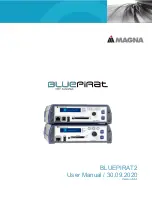
OMC-042 / 043 / 044 Data loggers
Users
’ manual
page 62
TCP Output
This is for sending data to an TCP server, see details below
Server
This is the IP-address or domain name of the TCP-server you want to send data to.
TCP port
Port on which the TCP-server is listening, which is 37 by default. When running your own TCP-server for
data collection (e.g. the one that comes with OMC-Data-Online) make sure that the chosen port is
forwarded by your internet router to the local IP-address of the system/computer running your TCP-
server.
Authentication
The method used to logon to the TCP-
server, this can be ‘Basic’ or ‘Digest’. When using ‘Basic’ the
credentials are transferred by TCP in plain text. This is quick and therefore consuming less power. When
using ‘Digest’ the password is uni-directional encrypted with a unique challenge token received from the
server. ‘Digest’ is more secure but will consume about 1 second more precious power time per transfer.
Note
: To spy a ‘basic’ password, a hacker has to breach the GPRS/3G communication or intrude the
local network where the server is running.
Data format
This defines the data format of the file’s content.
This can be our native TXT format, JSON or a CSV (comma separated value) format which can easily be
picked up by third party applications like Microsoft Excel. We prefer our native format as it can contain
data as well is diagnostic info.
Satellite Output (SBD)
A satellite transceiver can be deployed as the data logger's main communication device or as backup in
case the 2G/3G network is temporarily unavailable or out of reach (OMC-043/044 only). Please read
more at chapter “Accessory port – Iridium Satellite”.
TCP settings
[0] Exit
[1] Name >> TCP
[2] Send interval >> 01:00:00
[3] Send delay >> Not used
[4] Server >>
[5] TCP port >> 37
[6] Username >>
[7] Password >>
[8] Authentication >> Basic
[9] Data format >> Native(txt)
[R] Remove
[T] TCP test >> Not done
>















































